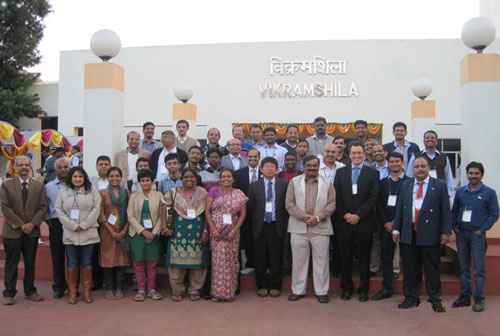“To make our Agriculture more resilient and yield more; to develop appropriate and affordable technologies for rural areas”- Mr. Narendra Modi, 102nd Indian Science Congress, 03-01-2015.
To celebrate the International Year of Soils, a National Soil and Water Networking Workshop was held at IIT, Kharagpur, India from 4-8 of January 2015 sponsored by Australia-India council, and organized jointly by The University of Sydney and the Indian Institute of Technology.
The National Soil and Water Networking Workshop was a success; the Indian scientists showcased high quality research and keen to collaborate in the GlobalSoilMap effort. Speaking at the workshop, the director of IIT Kharagpur urged a written agenda for joint collaboration between Indian and Australian counterparts to digitise existing soil data contributing to soil security and sustainable productivity. The Assistant Director General of Indian Council of Agricultural Research (ICAR), Dr. S.K. Chaudhari, welcomed the GlobalSoilMap initiative and was keen on developing Indian collaboration in the Global Soil Map effort.
The workshop kicked off with a welcome video By Professor Alex McBratney (Dokuchaev award winner in Soil Science), and soon the podium was taken over by Australian and Indian scientists to showcase research in soil and water arena.
The workshop discussed several key issues including soil security, digital soil mapping, India’s participation in the GlobalSoilMap, national level spectral libraries, soil data requirement in crop simulations, soil health mapping, hydrological model behaviour, and using soil digital and satellite data for hydrologic models. Distinguished speakers emphasised the need to provide fine scale soil fertility information to policy makers and managers which can further be used by industry partners/farmers to plan future land use and management options. This fits well with the requirement for India to participate in the GlobalSoilMap and push forward the concept of digital soil mapping. Digital soil mapping and spectroscopy techniques can accelerate the provision of fine scale information on soil fertility and conditions in India. It can also be used in monitoring and understanding soil nutrient change over time.
40 scientists from several distinguished institutes namely, ICRISAT, ICAR, IARI, CSIR, CSSRI, NIT participated in this workshop. The soil group was led by Prof. Budiman Minasny, Prof. Bhabani Das and Dr. Kanika Singh, and the Hydrology group by A/Prof. Willem Vervoort, Dr. Rajib Maity and Mr. Dipangkar Kundu.
Lastly, we thank Australia-India Council for funding this workshop and look forward to long term collaboration with IIT, Kharagpur and other such organisations in India to achieve collaborative research.

Leave a Reply